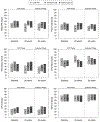Twelve-month psychosocial outcomes of continuous glucose monitoring with behavioural support in parents of young children with type 1 diabetes
- PMID: 37083018
- PMCID: PMC10524740
- DOI: 10.1111/dme.15120
Twelve-month psychosocial outcomes of continuous glucose monitoring with behavioural support in parents of young children with type 1 diabetes
Abstract
Aim: Managing type 1 diabetes in young children can cause significant stress for parents. Continuous glucose monitoring (CGM) may reduce parental burden. The Strategies to Enhance CGM Use in Early Childhood (SENCE) trial randomized parents of children (ages 2 to <8 years) with type 1 diabetes to CGM with family behavioural intervention (CGM + FBI), CGM alone (Standard-CGM) or blood glucose monitoring for 26 weeks before receiving CGM + FBI (BGM-Crossover). This report assesses changes in psychosocial outcomes for all groups over 52 weeks.
Methods: CGM + FBI (n = 45), Standard-CGM (n = 42) and BGM-Crossover (n = 44) participants completed psychosocial assessments at baseline, 26 weeks and 52 weeks. Repeated measures linear regression models evaluated change within and between treatment groups.
Results: The BGM-Crossover group reported improved diabetes burden (Δ -6.9, 95% CI [-11.3, -2.6], p = 0.003), fear of hypoglycaemia (Δ -6.4, CI [-10.1, -2.6], p = 0.002) and technology satisfaction (Δ 7.3, CI [2.4, 12.2], p = 0.005) from 26 to 52 weeks, similar to published findings in the CGM + FBI group over the first 26 weeks. The Standard-CGM group reported increased technology satisfaction (Δ 7.3, CI [0.6, 14.0], p = 0.027) from baseline to 52 weeks. The CGM + FBI group reported less diabetes burden and fear of hypoglycaemia from baseline to 52 weeks, but changes were not statistically significant. Scores from 26 to 52 weeks did not deteriorate.
Conclusions: Parents demonstrated psychosocial benefits following FBI that appeared to maintain without additional intervention. CGM-focused education with behavioural support likely helps parents of young children with type 1 diabetes reduce burden and worry in the short- and long-term.
Keywords: CGM; burden; fear of hypoglycaemia; randomized clinical trial; type 1 diabetes; young children.
© 2023 Diabetes UK.
Conflict of interest statement
PVC, LGK, BJA, and MEH have no conflicts of interest. LAD serves as a consultant to Vertex and receives research support to her institution from Dompe, Lilly, Mannkind, Medtronic, and Provention. LML serves as a Consultant/Advisor for Janssen, Boehringer Ingelheim, Medtronic, Dompe, Provention, Eli Lilly, Roche, and Dexcom. KMM has served as a consultant to Dexcom and has received donations of devices from Dexcom for studies funded by Helmsley Charitable Trust.
Figures
References
Publication types
MeSH terms
Substances
Grants and funding
LinkOut - more resources
Full Text Sources
Medical


